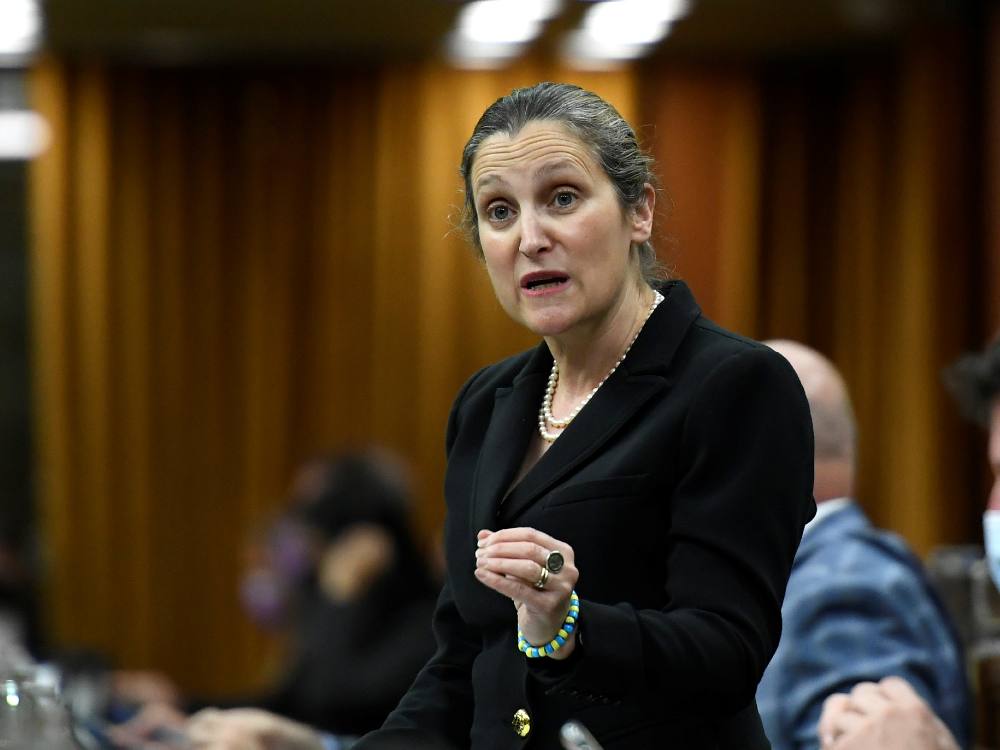The federal Liberal party’s 2021 campaign platform promised to no longer provide charity status to anti-abortion organizations “that provide dishonest counselling to women about their rights and about the options available to them at all stages of the pregnancy.”
Yet, ten months after re-election, despite repeated commitments to abortion rights in Canada, the government has refused to answer questions on whether there is a plan to implement this commitment, what groups could potentially lose charitable status and what would be the timeline for implementation. The lack of clarity has frustrated supporters, opponents and those supporting the charitable sector in Canada.
Despite the official silence, documents obtained by The Tyee and openDemocracy show that last fall there were extensive conversations among the Canada Revenue Agency, Health Canada and the Department of Finance about how to carry through on the promise. Redactions from those records, gained through an Access to Information and Privacy request, leave what was said largely in the dark.
Charitable status exempts organizations from paying income tax, allows charities to issue donation receipts to financial supporters and provides credibility.
The Liberal promise specifically names crisis pregnancy centres — organizations that counsel pregnant people against having an abortion — as one of the targets of this change. According to the Abortion Rights Coalition of Canada, there are 148 of these centres in Canada and more than 90 per cent have charity status.
“They engage in misinformation and deception,” said Joyce Arthur, the coalition’s executive director. While these groups are increasingly trying to pass for non-religious health-focused services, she said, “they don't provide health care and if anything, they kind of distort the whole meaning of health in terms of trying to prevent people from accessing a health-care service.”
Now is the time to bolster abortion rights in Canada, Arthur said, pointing to the recent U.S. Supreme Court ruling that overturned Roe v. Wade.
Revoking charitable tax status for deceptive anti-abortion groups, she said, will help in “reducing the impact that anti-choice groups have on undermining of our rights.”
Action Canada for Sexual Health and Rights, previously Planned Parenthood Canada, calls crisis pregnancy centres “anti-abortion organizations disguised as clinics.” The charity calculates that there are more crisis pregnancy centres than clinics and hospitals providing abortion in Canada.*
Advocates say there are many cases of crisis pregnancy centres deceiving pregnant people seeking health care to terminate their pregnancies. In 2019, for example, Global News reported the experience of Raquel, who unwittingly visited a crisis pregnancy centre in Langley, B.C., because its website said it provided “abortion support.” After stating she wanted an abortion, Raquel said staff suggested she listen to the fetal heartbeat. Staff guilted her for wanting to end her pregnancy and pushed for adoption, she said.
Conservative MP denies deception occurs
Cathay Wagantall, the Conservative MP for Yorkton-Melville, rejects the assertion that counselling at crisis pregnancy centres deceives women about their options. “I don't think there's a woman in Canada that isn't aware of the fact that they can get an abortion,” said Wagantall.
She said critics haven’t seen the work done by the centres, which provide programming to enable young moms to get back to school, among other things. Losing charitable status could threaten the existence of many of these centres, she believes. “My concern is that they are limiting a woman's avenues,” said Wagantall.
Six Conservative members of Parliament have presented petitions on the issue to the House of Commons since the start of the year. The nearly identical petitions state that crisis pregnancy centres save countless lives every year and that “revoking the charitable status of pro-life organizations will result in an explosion in the number of brutal abortions committed in Canada each year, slaughtering thousands of innocent babies.”
The petitions suggest the change would be a step toward the eradication of Christian values; petitioners call on members of Parliament to prevent any changes to the charitable status of pro-life organizations in Canada.
The potential change is also opposed by those who believe that the Liberals’ commitment politicizes the charitable sector in Canada.
Imagine Canada, an organization supporting the charitable sector in Canada, doesn’t take a stance on abortion or any other cause Canadian charities work on. It released a statement in April calling the proposed change “unnecessary and misguided.”
“It's our preference that the government not bring charities into highly partisan issues,” said president and CEO, Bruce MacDonald.
MacDonald said regulation already exists to enforce honest conduct by charities. “This idea that, whether it's this issue or any issue, that charities are operating or functioning dishonestly, that's an extraordinarily small percentage of the 86,000 registered charities and 90,000 non-profits in this country.”
In its statement, Imagine Canada wrote, “we are concerned our sector may become vulnerable to interventions driven by the political whims of future governments.”
MacDonald said his organization has not heard about the status of the commitment, nor has it been invited to join a participatory process to help shape the future of regulation on this issue.
“If it's okay for the Liberals to do this, then is it okay for the Conservatives or some other group to do something else?” asked Mark Blumberg, a lawyer based in Toronto who advises non-profits and charities.
“It was a clumsy attempt to create a bit of a culture war and I'm not sure what the upside of it is,” Blumberg added.
Blumberg is concerned the government’s proposal has not been fully considered. Because “anti-abortion group” has not been fully defined, it is unclear what groups this law would apply to. The extreme interpretation is that any group that opposes abortion could be ineligible for charitable status — but a more conservative interpretation is that only those engaged in intentional deception would be impacted, which he said is likely to be very few.
The government has not commented on whether the promise would apply to existing charities or only to those applying for status. If it did apply to existing organizations Blumberg said it could be years before any charity lost its status as a lengthy legal process would be involved. “I could just see so many ways they could do it better,” such as improving access to abortion in Canada, he said.
ATIP surfaces 900 pages of discussions, mostly redacted
While the government has been tight-lipped on the future of the promise, December mandate letters from the Office of the Prime Minister outlining priorities for Chrystia Freeland, deputy prime minister and minister of finance, and for Marci Ien, minister for women and gender equality and youth, reference the commitment asking the finance minister to introduce the amendments to the Income Tax Act and asking the women and gender equality minister to support this work.
On May 30 the government publicly tabled its response to one of the nine petitions from Conservative members of Parliament affirming that “registered charities that provide reproductive health services are required to provide accurate and evidence-based information to women with respect to their rights and options at all stages of their pregnancy.” The government reiterated its commitment to ensuring that organizations that provide dishonest counselling are ineligible for charitable status.
A request submitted under Canada’s Access to Information Act submitted by The Tyee and OpenDemocracy in late November 2021 was returned in late April 2022. The request sought internal records relating to the campaign promise and uncovered more than 900 pages of discussions which took place between September and December. During this time the Canada Revenue Agency, which oversees registered charities in Canada, liaised with Health Canada and the Department of Finance Canada on the commitment.
The substance of these conversations was largely redacted, citing the portion of the Access to Information Act that allows the head of a government institution to refuse to disclose information that “contains an account of consultations or deliberations involving officers or employees of a government institution, a minister of the Crown or the staff of a minister of the Crown.”
Neither the office of the deputy prime minister nor the Canada Revenue Agency provided answers to a variety of questions asked numerous times over nine months. Adrienne Vaupshas, press secretary with the office of the deputy prime minister and minister of finance, instead reiterated the government’s initial commitment, adding, “our government always has and always will defend reproductive choice and rights in Canada.”
The access to information request revealed that the Canada Revenue Agency drafted a response to The Tyee’s questions in October 2021 and decided not to send it. A staffer suggests they “politely decline to answer.”
In the meantime, those watching this issue are wondering when progress will be made. “I'm very confident that at some point they fully intend to go ahead with this,” said Wagantall. She said she and other opponents are in a holding pattern until the government makes its next move but she hopes the delay means the government is rethinking the promise.
Arthur from the Abortion Rights Coalition of Canada, which has been calling on the government to revoke the charity status of such groups for years, said she’d like to see the government take swift action, “given the reversal of Roe v. Wade, it’s critical the Canadian government fulfils their promise to disallow charitable status for anti-abortion groups as soon as possible. The activities of these groups threaten Canadians’ access to abortion services and undermine other government efforts to improve access.”
This report results from a collaboration between The Tyee and openDemocracy, an independent international journalism platform based in London, U.K.
* Story updated on Aug. 8 at 12:16 p.m. to clarify wording about facilities providing abortion in Canada. ![]()
Read more: Health, Rights + Justice, Federal Politics, Gender + Sexuality
















Tyee Commenting Guidelines
Comments that violate guidelines risk being deleted, and violations may result in a temporary or permanent user ban. Maintain the spirit of good conversation to stay in the discussion.
*Please note The Tyee is not a forum for spreading misinformation about COVID-19, denying its existence or minimizing its risk to public health.
Do:
Do not: